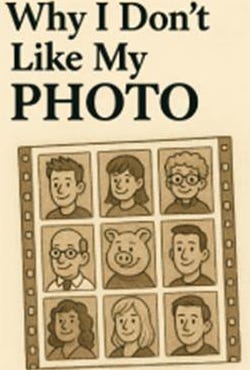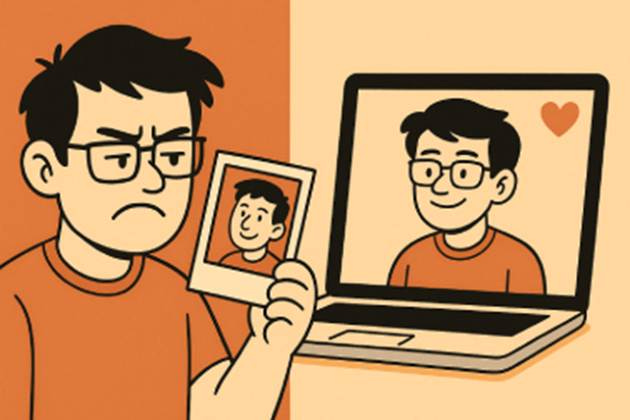Why I Don't Like My Photo
Or online dating
Why I Don't Like My Photo, Online Dating Trauma
Imagine you are an actor. You've gone to your photographer. They take a bunch of head shots. You get a contact sheet with your pictures. The photographer asks you to pick the one you want. Do you choose the best one? Nope. I have never seen a person pick their best picture.
Why is that? Read on because this essay will discuss the divide between "I," the inner person, and "I," the outer person. It will also explore how that divide shapes the problems of online dating profiles..
With cell phones, everyone is taking selfies. When I check my selfies, I almost never pick the friendliest photos of myself. At least that is what people tell me.
I take a selfie and show it to a friend
Me: This one
Them: "This is a nice picture where you are open and approachable."
Me: I don't know. I kinda look like a clown who lost his nose.
Them: No, you look handsome.
Do I believe them? I'll reject them instantly. I chose something more neutral and controlled. A half smile, a straight face. I never think I am looking for a photo that invites a person in. Or what an inviting look might look like when it is my face.
I point to the picture I like again.
Them: That one? Why would you pick that?
Me: I think it looks like me.
Them: Well, if you want a horrible version of yourself.
Gulp. A paradox selfies.
The world sees me one way, and I know another way. Erving Goffman would say it's impression management. Every time we present ourselves to the world, we're performing. There is an "other" whom we are trying to impress. We all dress up for work, dates, and even when we are alone. When I pick a photo for social media or—worse—online dating, I should be asking, "Does this look like me?" But I am not sure what I look like to the world. But I think I do. I might decide to have a picture with my dog. Or I am snowboarding and I'm covered in snow. "What role am I playing here?" I showed myself to be friendly by flipping burgers at a family barbecue. Or a picture where I'm wearing a shirt and typing, presenting myself as competent, interesting, and desirable.
I am playing a role that I believe defines me. If we thought of ourselves as actors, then we are presenting a very false image to the world. Actors are trained liars. They learn lines and present them as authentically as possible. I am not suggesting we always lie, but we do have certain cliches that often play out like scripts.
But there's something deeper at play than strategy. Jacques Lacan's mirror stage suggests that our sense of self originates in a misrecognition. To understand this picture, a baby crawls to a mirror and looks at itself. As infants, we see ourselves in the mirror and latch onto that external image as "me." Yet the real infant doesn't feel whole. It can't speak, it can't walk, and it needs its parent. It feels chaotic and fragmented. Its mirror image is an illusion of wholeness. Then we have parents or others who comment on how we look,
Parents looking at their baby in front of a mirror
Parent: Isn't he handsome? He has your eyes, Bob.
Baby thought: Who is Bob? I have another person's eyes!
Parent: Such a handsome boy!
Baby thought: All these people are looking at me. I must be exceptional. But I am helpless.
The outside reality of the others and the inner reality of the baby conflict. Our ego, then, is built on alienation: we are always chasing an external reflection that doesn't quite match how we feel inside.
This alienation is the essential issue in photographs. The "friendly" version of me—the one smiling with warmth—feels foreign. I don't trust it. Just as the infant mistrusts the mirror, I look at the photo and think: That can't be me. My friends may see authenticity, but I feel a gap between my inner sense of self and the external image.
Nowhere is this more evident than in online dating. Dating profiles are a condensed ritual of impression management and mirror-stage alienation. You curate photos, choose clever words, and sell your taste in books or your love for sushi. But the "you" on the page isn't you—it's a character. It's a fictionalized persona built out of fragments. And that's precisely what people fall in love with: not the living, breathing, contradictory human being, but the profile.
In a fictional novel, do you trust that the author is the "I" in the story? In a dating profile, is it fiction or non-fiction? It is a philosophical issue; whenever we interpret reality, it is entirely accurate. Nietzsche writes that a fact is an interpretation of a fact.
And here's the kicker: all writing is like this. Whether you're filling out a dating bio, writing a personal essay, or posting on Substack, there's always a fictionalized component. The "I" that writes is not the same as the "I" who lives. Language shapes, stylizes, and edits. What comes through is never the whole self, but a curated sense of self. We are like the baby who knows it is fragmented but sees itself as a whole. We often present a false narrative about who we are.
So yes—I hate my photos, and online dating is like reading King Lear and trying to figure out the subtext. They remind me that I am always alienated from my own image, continually constructing myself in mirrors and words. The friendly photo isn't wrong. It's just not the version of me I can bear to see.
Some fun things to try
1. The Photo Choice Test
Get five to ten photos of yourself.
Choose the one you like best.
Ask three friends to pick the one that shows you at your best.
Look at the choices. How do yours differ from theirs and why?
A reflection: What gap do you notice between your inner sense of self and how others see you?
2. The Mirror Exercise
In front of a mirror, look at yourself for one minute.
Then write down what you felt: i.e., details, judgments, emotions.
Ask a friend you trust to describe what they see.
Reflection prompt: Where do the two descriptions align? Where do they clash?
3. The Impression Inventory
List five roles you perform (for example: worker, sibling, friend, dater, social media user).
For each role, jot down what "costume" or impression you present (clothes, gestures, poses, tone).
Beside each role, write how authentic or inauthentic you felt. Use a scale of 1–10.
Also --Reflection prompt: Which role feels closest to your "true self"? Which one feels the most like acting?
Next, ask a trusted friend about your roles.
So what did you find out?
4. The Online Profile Rewrite
If you have a dating profile or social media bio, consider the following.
Rewrite it twice:
Exaggerate all your traits, make yourself a caricature.
Then strip it down to something bluntly raw and unpolished.
Compare both to the profile you actually use.
Ask a friend to write the profile> Compare and contrast.
Reflection prompt: What does each version reveal about the difference between performance and authenticity?
5. The First-Person Fiction Trick
Write a paragraph scene in the first person about your day.
Then rewrite the same scene in the third person.
Which version feels: which seems more truthful, which more fictional?
Reflection prompt: How does shifting the "I" change the story of who you are?




Interesting. I might do the photo choice with my friend.
Hmmm I will try your thoughts now.. click ask and verify my own presence 👏👏👏 beautiful and thoughtful as well 🤗